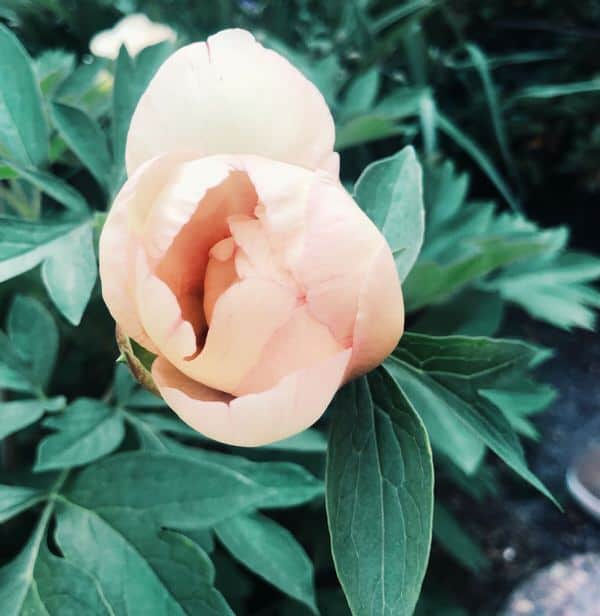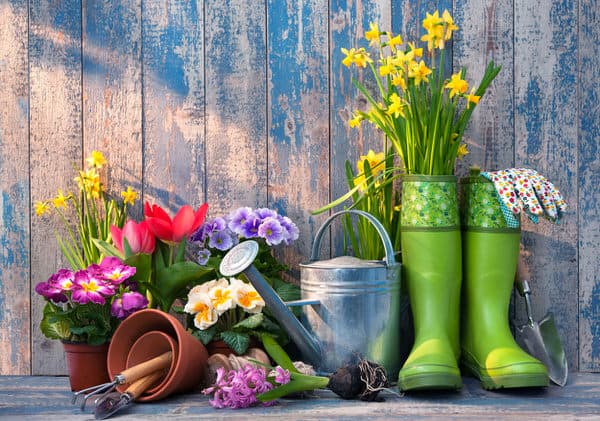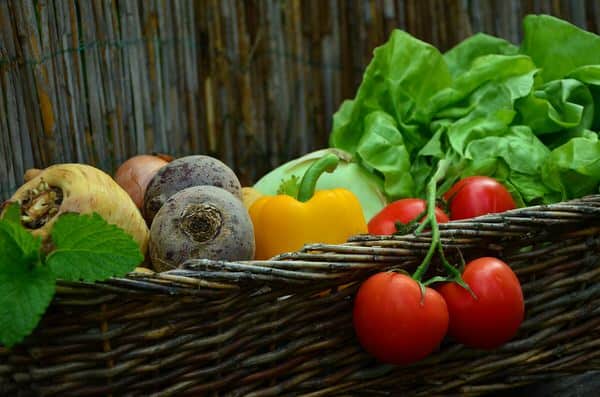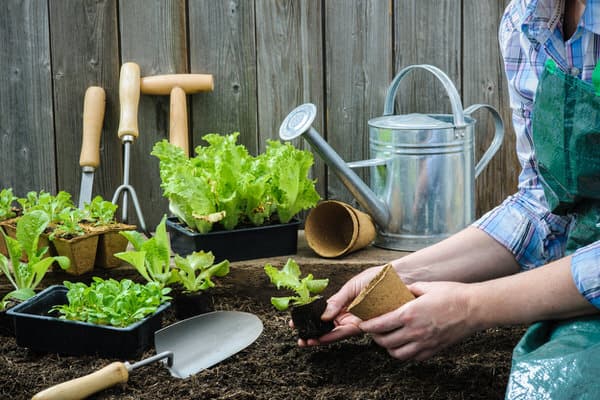Gardening is a hobby that yields big rewards. It can give you a patio or backyard that looks beautiful. Or a vegetable garden that produces a bumper crop of tomatoes which taste far better than the ones you buy at the store. In short, you get the satisfaction of seeing your hard work pay off.
But did you know that working in the garden helps you live a longer and healthier life? Here are 7 reasons to garden for health.

1. Get physical exercise
The exercise you get from gardening compares to working out at the gym. On average, working in your garden at a moderate pace for 60 minutes burns 200-400 calories. That’s about the same amount as 45-60 minutes on an elliptical trainer, or an hour of weights, squats and ab crunches. Is it any wonder that someone might prefer to burn calories in the garden?
Regular exercise like gardening helps lower your blood pressure and reduce your risk of stroke and heart attack. It’s also a type of weight-bearing exercise that helps you avoid osteoporosis.
If bending over strains your back, try gardening in raised beds like this one.* Or do container gardening, where you can grow fruits and vegetables as well as flowers.
2. Spend time outdoors
According to the Environmental Protection Agency (EPA), the average American spends 93% of her time indoors. That breaks down to 87% inside buildings and another 6% in automobiles. Gardening helps you get outside.
Spending time in the fresh air can improve your mood. Plus it exposes you to Vitamin D from the sun. This helps you absorb calcium better, which in turn is good for your bones.
Digging in the dirt may even mimic the effects of an anti-depressant. Soil contains the harmless strain of bacteria called Mycobacterium vaccae. When researchers injected mice with Mycobacterium vaccae, serotonin was released and metabolized in parts of the brain that control cognitive function and mood.
In other words, bacteria found in soil worked similarly to serotonin-boosting antidepressant drugs.
These findings corroborated a study of cancer patients who reported improvements in their quality of life after being treated with the same harmless bacteria.
Don’t discard your anti-depressant prescription just yet. But see if you might garden your way to better mental health.

3. Bust your stress
Not only does it lift your spirits to spend time outside, but the physical activity of gardening helps you work off stress. Turning the soil and connecting with plants stimulates different parts of the brain-body connection than you might use in your normal routine.
Gardening can tire you out, but it’s generally a “good tired,” one that comes with a sense of accomplishment or satisfaction. You may not have solved that problem back at the office, but you’ve conquered weeds and pruned unruly branches at home. At least for today.
Stress often gives you vague feelings of anxiety. Even if you can identify stressful things in your life, you may not be able to pin down exactly why you feel stressed.
But when you garden, you see specific, positive results. You witness a more tangible link between your efforts and your progress.
4. Reduce your risk of dementia
On top of experts’ advice to reduce your risk of dementia by getting physical exercise, lots of studies show gardening specifically benefits your brain.
One notable project followed 2805 Australian men and women ages 60+, living in the community and initially free of cognitive impairment. Over the course of 16 years, investigators found the following factors to predict lower risk for dementia:
- daily gardening: 36% risk reduction
- daily walking: 38% risk reduction for men, but no significant difference for women
- moderate alcohol intake: 34% risk reduction
My conclusion: work in your garden, then enjoy a glass of wine as you admire your work from a patio lounge. Cheers!
Gardening classes
Another way gardening benefits your brain is if you learn about different plants, pruning, and cultivation techniques. Many communities and non-profit organizations offer classes that challenge your mind as well as help you make your garden look beautiful.
For example, Filoli, a historic estate in Woodside, California, has expansive gardens that are open to the public. The Filoli Center offers events and classes.
My friend Nina just completed Filoli’s horticultural certificate program called A Year in the Garden. This program includes both lectures and hands-on experience. Students learn about botany for gardeners, plant identification, pest management, propagation and more.

5. Garden with children
A fifth reason to garden for health is that it can bring different ages together. Research shows that multi-generational activities benefit both younger and older people.
You can enjoy digging in the garden with your grandkids or neighbor children. You can volunteer with a nearby school or community center to help kids grow vegetables or flowers.
Experts on “good bacteria” in your digestive tract suggest exposing children to dirt can boost their immune systems. For more information, check out this NPR interview with Jack Gilbert, University of Chicago scientist and co-author of Dirt is Good: The Advantage of Germs for Your Child’s Developing Immune System.*
6. Eat healthy food you’ve grown yourself
If you grow your own vegetables, you can do it without pesticides or other toxins. You’ll eat better for less money than buying organic produce at the grocery store.
Leading diets encourage you to eat more vegetables. I’ve been experimenting with one called the Wahls Protocol that prescribes 9 cups of vegetables per day.
If for no other reason than lowering my own grocery bill, I should start growing vegetables in my backyard.

7. Be creative
Creative pursuits like writing, music, art, AND gardening stimulate your brain to think in new ways. Researchers have connected creativity with what they call the personality trait of openness, or the cognitive flexibility and willingness to entertain new ideas.
The openness you develop through creative activity turns out to be a “lifelong protective factor.” Individuals who are highly creative tend to maintain the integrity of their brains’ neural networks into old age.
One thing I love about gardening is that it gives you tactile experiences. You comb through the soil with your fingers, shake apart root-bound plants, then settle them into the dirt. Gardening combines mental work with tactile work. In this way, it resembles other creative activities like painting, sculpting, knitting or playing music.
Yet, even if you don’t enjoy the physical/tactile element of gardening, you can still garden for health. Learning about plants, designing your garden and creating beautiful spaces not only will improve your life now. It will help you live longer and healthier in the years to come.
Garden for health: how to get started
Even if you’ve never tried your hand at gardening, you can succeed with this timeless hobby. Start small. For example:
- At first, work on only one planting area. To make things really simple, order a raised bed like this one* or the one linked in #1 above. A raised bed is more comfortable on your back. Plus it gives you the advantage of using quality soil from the plant nursery, instead of trying to amend the soil in your yard.
- Try container gardening. You can grow flowers, vegetables, and even fruit in containers. Vertical gardening, a variation on container gardening, allows you to make the most of a small patio.
- Choose succulents. Although not fool-proof, succulents can provide lasting beauty with limited effort. Check out my daughter-in-law’s blog post, Plant Parenthood: How to Avoid Killing Your Succulents.

Conclusion
Seven ways that gardening benefits your health are:
- physical exercise
- time outdoors
- stress buster
- brain booster
- multi-generational activity
- healthy food
- creativity
Sun, water, temperature and other climate factors affect how well your garden grows. Part of gardening’s allure is the partnership between your efforts and the mysteries of plant growth. You connect with something beyond yourself as you watch tiny plants grow larger.
Call it a universal force, or Mother Nature. Call it God. But when you garden for health, you take part in something bigger that requires your work but doesn’t depend completely on you.
Maybe that’s the real secret to health and longevity: finding a partnership that goes beyond yourself. Go out make this truth your own.
You can start in your garden.
Resources for further reading
- Better Homes and Gardens Gardening Made Simple: The Complete Step-by-Step Guide to Gardening* by Better Homes and Gardens
- Container Gardening: 250 Design Ideas & Step-by-Step Techniques* by Editors of Fine Gardening
- Simple Steps to Success: Fruit and Vegetables in Pots* by DK
- Essential Succulents: The Beginner’s Guide* by Ken Shelf and Rachel Weill
Images via: Shutterstock, Pixabay, AHR



